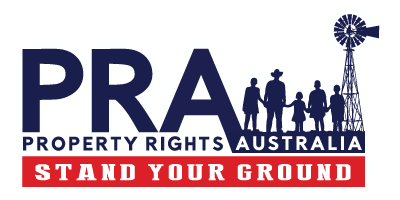8th August 2011
New property rights boss takes on CSG companies
The first female president of a national land rights advocacy group, Joanne Rea, has accused the Department of Environment and Resource Management of behaving as “advocates for the coal seam gas industry” during recent Senate committee hearings in southwest Queensland.
Ms Rea is a Central Queensland grazier who recently took over as president of Property Rights Australia from Gracemere beef producer, Ron Bahnisch.
She described the burgeoning coal seam gas industry as “a huge issue, which has farmers locked in a David and Goliath struggle.
“Never has a disregard for agriculture and property rights been more evident, with DERM behaving, not like the umpire, making sure that too scant regulations are adhered to, but as advocates for the CSG industry.
“This came through again and again in the presentations to the Senate committee,” Ms Rea said.
An indication of problems land owners were facing could be seen in one particular area known as the Condamine Alluvium – a small, productive and valuable piece of prime farming land east of the Condamine River.
Only individual farmers or small farmer groups had dared to ask the Senate hearings for a permanent stay on CSG mining in this vital area.
“Some individuals made very strong presentations and are putting in huge hours to try to hold the CSG companies to account, and they are being thwarted by a DERM which is only too happy to persecute farmers, but who are ‘kowtowing’ to the gas companies,” Ms Rea said.
“It was revealed at the inquiry that at the same time as CSG companies have had their unlimited access to water in the Condamine Aquifer reaffirmed by Section 185 of the Petroleum and Gas Act, farmers on the Condamine Alluvium, according to the Central Downs Irrigators Ltd. were having access reduced and had to pay for the installation of new meters on their bores,” she said.
The State Government had made much of its “make good” provisions if a bore was dewatered by gas extraction.
“No one has a clue what this means, or how a company will make good. They have three years to do it, no one knows what negotiations will take place or whether it will go to court and a level of proof will be required.
“Until there is some experience of how it will work in practice, it is a meaningless phrase,” Ms Rea said.
Senator Bill Heffernan’s comment at one of the hearings had summed this up: “No-one till this point today knows what to do about the salt even if they do desal it. What is wrong with the politicians up here? If I were in charge, man! This is an insult to the producers of food, the planet and common sense.”
She said the Condamine Alluvium was judged to be some of the top three to four percent of intensive farming country in Australia, comprising a natural active floodplain with high yields on minimal water. The underlying Condamine Alluvial Aquifer is very high quality water with little salt.
“As is the case with all irrigation farming, the farmers are licensed with volumes monitored and all water allocations paid for.
“Twenty years ago they suffered first a cut in allocation to 70% without compensation and then a cut to 50% in allocation during the drought also without compensation in order to preserve the integrity of the underlying Condamine Aquifer. Crops perished,” Mrs Rea said.
In contrast, the CSG companies had “unlimited, unpaid for and unmetered rights to take or interfere with as much water as they like”.
“It is quite possible that this delicate aquifer below our very best farming land will be rendered useless.
“If the CSG companies were required to meter and pay for their water and suffer cutbacks without compensation as the farmers do, they may regard it as a valuable property rather than a waste product which they have to dispose of,” she said.
There was also a fear, due to connectivity with the Walloon Coal Measures, that if this was dewatered and depressurised, gravity would cause water to flow from the Condamine aquifer to the Walloons.
“This is before even any above ground effects such as farming around a mess of wells pipes, bores and all-weather roads on a flood plain are considered,” Ms Rea said.
For further information contact:
Joanne Rea: PO Box 609 Rockhampton 4700
Mobile : 0407 143 664 Ph: (07) 49 213430 Fax : (07) 49 213 870 Email: pra1@bigpond.net.au
________________________________________________________________________________
PRA is a non-profit organisation of primary producers and business people from rural
areas defending the rights of property owners
www.propertyrightsaustralia.org
